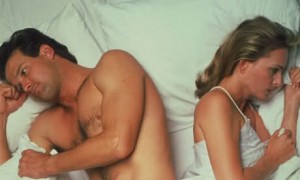Lost Your Mojo? It's Not You, It's Your Hormones
This statistic troubles me: 57 percent of women prefer Facebook to sex. While the data arose from a questionable source (Cosmopolitan), it reflects a general feeling of “meh” that many of my patients and online clients have toward sex. I see it daily in my functional medicine practice, and the symptom points to a larger, more disturbing problem.
 I consider sex drive as the canary in the coal mine of overall physical and mental health, and sadly, the state of women’s health, longevity, and happiness is declining.1http://www.nber.org/papers/w14969; http://nwlc.org/declining-life-expectancies-show-why-womens-health-should-be-priority/; … Continue reading
I consider sex drive as the canary in the coal mine of overall physical and mental health, and sadly, the state of women’s health, longevity, and happiness is declining.1http://www.nber.org/papers/w14969; http://nwlc.org/declining-life-expectancies-show-why-womens-health-should-be-priority/; … Continue reading
As a result, low libido is common, but few understand that in most cases, the root cause is hormonal, not some moral failing or intrinsic problem of lack of love and connection. People might know hormones and sex go together, but don’t know which hormones matter or how they interact to create sexual interest, and even toe-curling orgasms. Most importantly, they don’t know they can take an active role in resetting the hormones causing low libido.
If you’d rather mop the floor than have sex, there’s a good chance there’s a hormone problem. Before you resign yourself to mercy sex, consider this: I believe that sexuality is a portal to other areas of your life, and when you optimize your sex life, there are many resulting benefits you may not even realize: You will find freedom in other aspects of your life where there was once struggle. You heal from the inside out, which is far better and more sustainable than seeking the latest band-aid to the problem. This is true no matter how often you have sex.
After years of working with people who want to get their mojo back, I know that low sex drive, poor energy, lousy sleep, skin problems, and bloating aren’t diseases that can be fixed fast with a pill or shot. These are usually hormonal problems. And low libido is one sign that our body may be trying to tell us that something is wrong.
Root Causes of Low Sex Drive
Approximately 70 percent of low sex drive is due to misfiring hormones. Of course there are other considerations, such as communication and intimacy, emotional currency, sexual variety, mismatch of expectations and style, frequency and type of sexual connection. For a healthy, deepening sexual connection, these areas need to be explored, mined, and renegotiated.
Many women believe (as I did) that they don’t have to worry about their hormones until menopause, but the truth is that your hormones start to change in your twenties. DHEA and testosterone begin to decline. Cortisol, the main stress hormone, can start to climb and rob your other sex hormones. For some women, estrogen and/or progesterone can drop, leading to estrogen dominance, or PMS. You may experience high testosterone (such as with polycystic ovarian syndrome) or low testosterone (as a result of excess stress or aging). Or your thyroid may start to sputter. Other hormones get in on the act, including oxytocin, insulin, and ghrelin, but these are the main hormonal problems I see daily as part of the story of low libido.
1. Cortisol (too high, too low, or rises and falls). It’s important to understand that dysfunctional stress in the body is the root cause of most if not all hormone imbalances, and one of the earliest signs can be lower sexual desire. The underlying reason for wayward cortisol varies from person to person, but it’s important to know if cortisol is off for you. For me, cortisol crashed in my mid-30s after having a baby – I was trying to be all things to all people, running myself ragged as a working mom and OB/GYN, and chasing a dream that didn’t belong to me as a surgeon and academic. My poor husband felt neglected and rejected as my libido tanked, and it took taking on my own hormones to understand the central role of cortisol in sex drive and my more global energy.
Signs of Imbalanced Cortisol:2Note that I’ve included only a partial list of symptoms for each hormone. To learn more, click here to check out my MindBodyGreen online course … Continue reading
- Feeling wired, but tired
- Running from task to task, feeling overwhelmed
- Sugar or carb cravings
- Difficulty falling or staying asleep
- Feeling burned out, fatigued, particularly under stress
- Increased belly fat or weight gain
- Unstable blood sugar – too high, too low, or both
- Skin conditions such as eczema
2. Estrogen (too high, too low, or rises and falls). Estrogen is the main female hormone. It causes the female body to grow breasts and hips (in men, too much can lead to male breasts and estrogenic fat deposits at the hips). When it’s in balance with its counter hormone, progesterone, your period arrives on time, your skin is clear, and your moods are generally stable.
Signs of Imbalanced Estrogen:
- Bloating or water retention
- Abnormal Pap smears
- Heavy or excessively light (even absent) periods
- Breast tenderness or cysts
- Mood swings or PMS
- Rapid weight gain, particularly at the breasts or hips
- Migraines
- Red flush of the face, or rosacea
- Vaginal dryness or atrophy
3. Thyroid (too low). When your thyroid gland in your neck is underperforming, you feel flat and lackluster in most areas. Your hair thins, particularly eyelashes and the outer third of the eyebrow. The origin varies from person to person, and could step from autoimmune destruction (Hashimoto’s thyroiditis) or secondary to high cortisol, or even from endocrine disruptors like Bisphenol A or flame retardants.
Signs of Low Thyroid:
- Fatigue, particularly in the morning
- Weight gain
- Mood problems, such as low-grade depression
- Headaches
- Dry, straw-like hair that tangles easily
- Hair loss or thinning (particularly lashes and outer third of eyebrow)
- Decreased sweating
- Cold hands and feet, or intolerance of cold
- Constipation
4. Testosterone (too high, too low, or a combination). Testosterone begins to decline in your twenties, which is why you don’t respond to weight training with the same gusto that you did as a teenager. But the worst culprit when it comes to low testosterone is taking oral contraception. The pill raises your sex hormone binding globulin (SHBG), which is like a sponge that soaks up the available testosterone in the body. As a result, you may experience low sex drive, vaginal dryness, and even pain with insertion. Even worse, the problem might take up to a year to resolve after going off the Pill.3http://www.ncbi.nlm.nih.gov/pubmed/16409223, https://www.sciencedaily.com/releases/2006/01/060104232338.html
High testosterone is also one of the defining characteristics of polycystic ovarian syndrome (PCOS), which affects 30 percent of American women.
Signs of Imbalanced Testosterone:
- Acne or greasy skin
- Rogue hairs, especially on face, chest, or arms
- Skin tags
- Anxiety or depression
- Fatigue
- Loss of confidence and agency
- Poor muscular response to high-intensity or weight training
- Irregular menstruation (cycles longer than 35 days, or skipping cycles)
- Infertility or subfertility
How to Raise Your Libido, Naturally
For far too long, there has been this prevailing belief that declining sex drive is simply inevitable; that it’s a part of being a modern and busy woman (or man), that it’s part of aging, that it’s part of life after child-bearing years, that it’s part of long-term monogamous relationships, etc. I disagree. Declining libido is not normal.
Nothing annoys me more than a doctor who brushes aside pain points like low libido as simply a “symptom of aging.” I believe it is both possible and important for a woman to maintain a strong sex drive long past her childbearing years. It takes a little work – maintaining balanced hormones, trying some proven botanicals, a little self-love, and a steady diet of quality orgasms – but more than worth it in the long run. Of course, libido will naturally wax and wane. Ultimately, it’s your choice.
Every day we hear about a different method to boost your sexual energy, your life force, your libido. Take this supplement! Read 50 Shades! Increase variety! Drink green tea. Don’t have any caffeine. Have sex in the morning only! Try this fantastic new lubricant! Lose weight! Eat fewer carbs. Eat more carbs. Eat carbs before protein. Eat carbs at night. Eat oysters! Drink less. Drink more. It’s totally confusing and often not based in any scientific research.
Here are some of the most proven ways you can rev up a flagging sex drive.
- Add an adaptogen. If your cortisol is too high, too low, or both within the same day, start taking a double adaptogen like ashwagandha. I mix a pure organic powder with hot water and drink it twice per day as a tonic for stress.
- Change up your sexual routine. You may need to bring in some variety along with resetting your hormones. My favorite is Orgasmic Meditation (OM), a cross between mindfulness and genital stroking, for 13 minutes as popularized by Tim Ferriss in the Four Hour Body.4Tim Ferriss. The 4-Hour Body: An Uncommon Guide to Rapid Fat Loss, Incredible Sex and Becoming Superhuman, 2010 (Harmony, New York). I find that OM is a wonderful practice for people who are tired of sex, or tired of how fat they feel, or just tired tired TIRED. It fills your tank with oxytocin, and we all need more of that! Oxytocin raises testosterone in men, and lowers cortisol. In women, it raises estrogen and makes the thyroid work better!
- Make a medicinal maca shake. I’m a fan of occasionally drinking your nutrition, especially if you’re on the go and find it hard to eat well. I found during my hormonal recovery that my blood sugar is most stable when I started my day with yummy protein shakes. (You can hear more about my personally-formulated medicinal shakes in my new online course with MindBodyGreen right here.) Maca is a libido-boosting herb native to Peru that is proven to nourish endocrine glands. Studies show that it raises sex drive in women, and reduces anxiety and depression. It’s my herb of choice for women with low estrogen.
- Visit your health professional. Visit a collaborative functional medicine doctor who will work with you to identify the root causes and find a natural solution. Sometimes the culprit is overwork and high stress, sometimes it’s a medication, like the Pill or an antidepressant. Get the help you need to test your hormones and come up with a smart plan to get your mojo back.
It’s important to your health that you make sexual pleasure a priority. We’re not talking Hollywood filming here, rather the real, enjoyable approach to sex that is your birthright and underpins optimal physiology. My goal for you with sexual energy is to nurture your body over time, and to identify your true sources of sexual energy. Keep your focus on the natural remedies, the proven potions that truly work for you and last long term. By keeping your hormones in balance, you can keep your mojo fire stoked.
References
| ↑1 | http://www.nber.org/papers/w14969; http://nwlc.org/declining-life-expectancies-show-why-womens-health-should-be-priority/; https://www.psychologytoday.com/blog/pressure-proof/201303/women-happiness-is-it-still-declining |
|---|---|
| ↑2 | Note that I’ve included only a partial list of symptoms for each hormone. To learn more, click here to check out my MindBodyGreen online course with the complete symptom list. |
| ↑3 | http://www.ncbi.nlm.nih.gov/pubmed/16409223, https://www.sciencedaily.com/releases/2006/01/060104232338.html |
| ↑4 | Tim Ferriss. The 4-Hour Body: An Uncommon Guide to Rapid Fat Loss, Incredible Sex and Becoming Superhuman, 2010 (Harmony, New York). |

